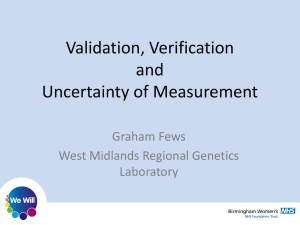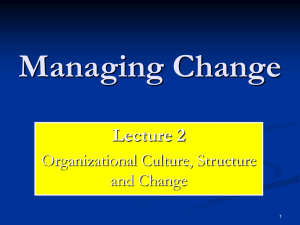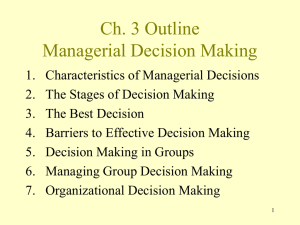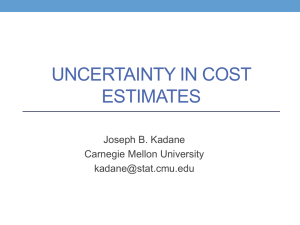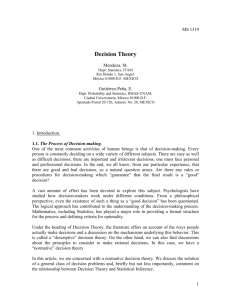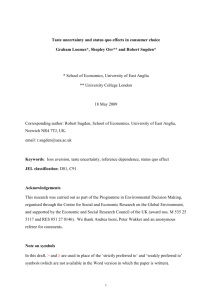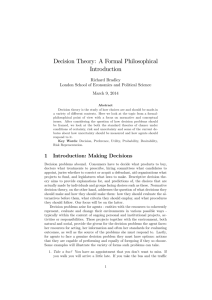Séminaire interne LABEX - Labex MME-DII
advertisement
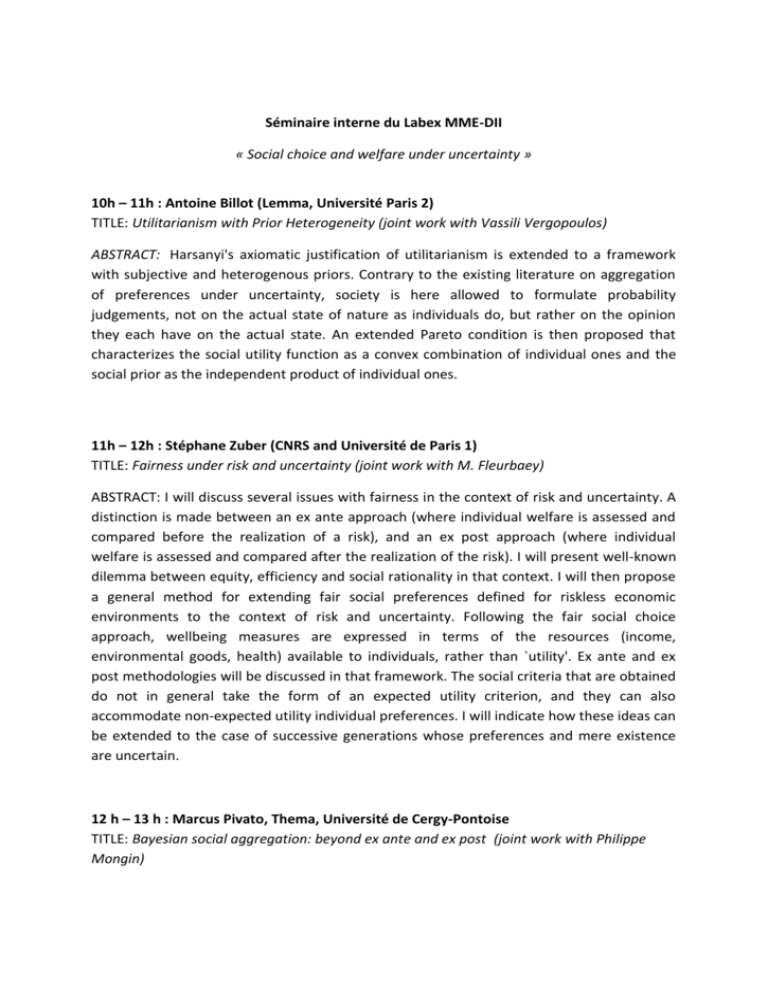
Séminaire interne du Labex MME-DII « Social choice and welfare under uncertainty » 10h – 11h : Antoine Billot (Lemma, Université Paris 2) TITLE: Utilitarianism with Prior Heterogeneity (joint work with Vassili Vergopoulos) ABSTRACT: Harsanyi's axiomatic justification of utilitarianism is extended to a framework with subjective and heterogenous priors. Contrary to the existing literature on aggregation of preferences under uncertainty, society is here allowed to formulate probability judgements, not on the actual state of nature as individuals do, but rather on the opinion they each have on the actual state. An extended Pareto condition is then proposed that characterizes the social utility function as a convex combination of individual ones and the social prior as the independent product of individual ones. 11h – 12h : Stéphane Zuber (CNRS and Université de Paris 1) TITLE: Fairness under risk and uncertainty (joint work with M. Fleurbaey) ABSTRACT: I will discuss several issues with fairness in the context of risk and uncertainty. A distinction is made between an ex ante approach (where individual welfare is assessed and compared before the realization of a risk), and an ex post approach (where individual welfare is assessed and compared after the realization of the risk). I will present well-known dilemma between equity, efficiency and social rationality in that context. I will then propose a general method for extending fair social preferences defined for riskless economic environments to the context of risk and uncertainty. Following the fair social choice approach, wellbeing measures are expressed in terms of the resources (income, environmental goods, health) available to individuals, rather than `utility'. Ex ante and ex post methodologies will be discussed in that framework. The social criteria that are obtained do not in general take the form of an expected utility criterion, and they can also accommodate non-expected utility individual preferences. I will indicate how these ideas can be extended to the case of successive generations whose preferences and mere existence are uncertain. 12 h – 13 h : Marcus Pivato, Thema, Université de Cergy-Pontoise TITLE: Bayesian social aggregation: beyond ex ante and ex post (joint work with Philippe Mongin) ABSTRACT: Suppose a society must make policy choices while facing uncertainty about the outcome of these choices. Each policy determines a social prospect, which will yield a payoff for each individual, but these payoffs depends upon the (unknown) state of nature. The problem is how to choose the best social prospect, given uncertainty about the true state of nature. The first major result in this area was Harsanyi's Social Aggregation Theorem. This theorem (and its generalizations) begins with two premises: (1) all individuals (and society as a whole) are rational agents, and (2) the decisions of society should conform to the ex ante Pareto axiom, which says that, if everyone prefers prospect X over prospect Y, then society should also prefer prospect X over prospect Y . From these two premises, Harsanyi deduces that society should seek to maximize the expected value of a utilitarian social welfare function. However, existing versions of Harsanyi's theorem suffer from three shortcomings: 1. They assume that all agents can formulate preferences over all possible social prospects, even those which are infeasible or logically absurd. 2. They assume that all agents are subjective expected utility (SEU) maximizers —i.e. each agent seeks to maximize the expected value of her utility function with respect to her probabilistic beliefs. 3. They imply that all agents must have the same probabilistic beliefs. Given the doxastic heterogeneity we observe in the real world, this is generally regarded as a reductio ad absurdum of the whole approach. We relax the SEU assumption by only requiring the individuals and the society to satisfy the Statewise Dominance axiom, which is arguably the bare minimum requirement for rationality. Furthermore, we relax the “universal domain” assumption, by only requiring agents' preferences to be defined on an open, connected set of social prospects. From these weaker hypotheses, we still obtain the conclusions of Harsanyi's theorem; SEUmaximization appears as a conclusion of our theorem, not a hypothesis. Unfortunately, this still yields the aforementioned agreement in probabilistic beliefs. To resolve this, we introduce two independent sources of uncertainty: one objective, and one subjective. In this framework, we obtain a version of the Social Aggregation Theorem that is compatible with diversity in beliefs. In our result, ex ante social preferences still maximize expected value of a utilitarian social welfare function, and all agents must have the same beliefs about the objective uncertainty source. But they can have different beliefs about the subjective uncertainty source.



